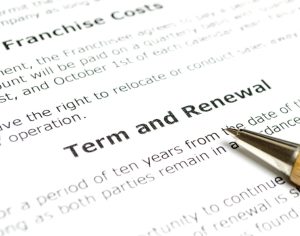I have fond memories of being a girl guide. I spent many happy hours learning to bake fairy cakes in a biscuit tin over an open fire and building washing-up stands from sticks and string. When I became a guide, I made a promise that began with the words “I promise that I will do my best”. What does this trip down memory lane have to do with franchising, I hear you ask? It’s because franchisees also promise that they will do their best.
In most cases, the franchise agreement imposes absolute obligations on the franchisee – in other words, the obligations will be framed so that the franchisee must do the things they say they’re going to. But sometimes, it’s not possible to guarantee that something can be done, only that the franchisee will try their best to do it. This is where endeavours clauses come in.
An endeavours clause is typically used where there are factors outside the party’s control: while they can’t guarantee a particular outcome, they effectively agree to try. A common example is a clause that the franchisee will use best endeavours to promote and extend the business in their territory. The franchisee can’t guarantee that they will be able to extend the business because there may be other market forces at work that mean that, despite every effort, the business doesn’t grow.
Endeavours clauses can also be useful where the parties aren’t able to predict or cover every eventuality. If it was possible to predict every situation that might arise, then the agreement could specify what action had to be taken in each of those situations. However, life often takes unexpected twists and turns. Sometimes all a party can do is to try their best to secure the desired outcome in spite of the fact that something unexpected has arisen. “
Where this starts to get interesting is deciding just how hard the party has to try in order to meet their obligation. Common contract wording includes using “best endeavours”, “reasonable endeavours” or a host of variations. It’s generally accepted that “best endeavours” is the highest standard and the closest to an absolute obligation; reasonable endeavours is the lowest standard, requiring only a reasonable attempt to do the desired thing. But what do these terms actually mean?
This has been fruitful ground for litigation over the years. In 2011, Blackpool Airport found itself in dispute with Jet2 Airlines over its agreement to use best endeavours to promote Jet2’s low-cost flights and use all reasonable endeavours to provide a cost base that would facilitate them. For several years, Blackpool allowed Jet2 to operate outside its normal opening hours but the airport then changed its mind, forcing Jet2 to reschedule its flights at short notice, which the airline argued was a breach of the airport’s endeavours obligations. Blackpool lost the case even though allowing Jet2 to operate outside the airport’s normal opening hours involved the airport incurring substantial costs.
The case illustrates that in pursuit of using best endeavours, the franchisee may have to do something that is against their own commercial interests or that involves incurring costs and losses. However, the judge in the Blackpool case also warned that this type of clause has to be interpreted according to the specific facts and circumstances of each case, so in a different situation best endeavours might mean something different.
In light of this, using endeavours clauses can create uncertainty, which is generally not a good thing in franchise agreements or in any commercial contract. One way around this is to set out the specific steps that a party is expected to take to try to achieve the desired outcome. For example, instead of an obligation for the franchisee to use best endeavours to promote the business in the territory, the agreement could specify that the franchisee is required to spend at least a certain amount on advertising each year. Alternatively, it could stipulate that they must carry out certain activity as a minimum – such as committing to a 10,000 household leaflet drop or taking out a given number of adverts in local press over a certain period of time.
Another common example of this type of clause in franchise agreements is an obligation on the franchisee to use best endeavours to protect the reputation of the brand. Clearly the franchisee cannot guarantee to protect the brand because goodwill may be damaged by any number of things that the franchisee has no control over. However, establishing what exactly the franchisee has to do to discharge the obligation could be difficult. Compare this to the similar negative obligation that the franchisee doesn’t do anything that would damage the brand. As this relates to things that the franchisee does or doesn’t do, it is within the franchisee’s control and so can be an absolute obligation rather than an endeavours clause.
As none of us can predict the future, using endeavours clauses rather than absolute obligations can be attractive. However, in light of the uncertainty that these clauses create, they are best avoided wherever possible. If endeavours clauses can’t be avoided, then it may be helpful to set out the steps that the party in question is required to take in pursuance of the objective. Leaving an endeavours clause without a clear explanation of what is required is a risky business.”

Kate Legg
After more than a decade advising other business owners, Legg has recently fulfilled a long held ambition and become one herself. Now the founder, director and CEO of Komerse, a legal practice specialising in commercial law and franchising, Legg is clearly practising what she preaches.

Kate Legg
After more than a decade advising other business owners, Legg has recently fulfilled a long held ambition and become one herself. Now the founder, director and CEO of Komerse, a legal practice specialising in commercial law and franchising, Legg is clearly practising what she preaches.


































